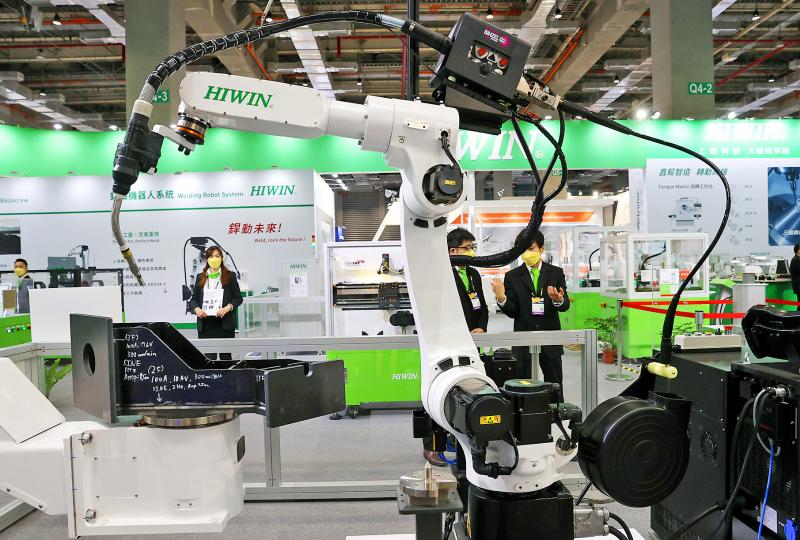A business alliance dedicated to advancing smart manufacturing technology led by Hiwin Technologies Corp (上銀科技) was established yesterday.
The alliance would lead Taiwan’s machine tool manufacturing industry in intelligent transformation, starting with upgrading spare parts, components and accessories for different types of machine tools, Hiwin Technologies chairman Chuo Wen-heng (卓文恒) said.
The alliance is made up of 30 machine tool manufacturers, including Victor Taichung Machinery Works Co (台中精機), Taiwan Takisawa Technology Co (台灣瀧澤) and Tongtai Machine and Tool Co (東台精機).

Photo: CNA
All of the members have introduced smart ball screw technology for use in the manufacturing of machine tools, Hiwin said.
Ball screws translate rotational motion to linear motion and are a key component of precision machines.
Intelligent ball screws can increase the added value of the machine tools industry and help Taiwan’s machinery industry undergo smart transformation, Chuo said.
Smart ball screws are equipped with sensors to detect signals regarding the physical properties of ball screws in operation and can simultaneously monitor many machines, reducing downtime.
Their use can help reduce the use of lubricants, which is good for the environment, Hiwin Technologies said.

Meta Platforms Inc offered US$100 million bonuses to OpenAI employees in an unsuccessful bid to poach the ChatGPT maker’s talent and strengthen its own generative artificial intelligence (AI) teams, OpenAI CEO Sam Altman has said. Facebook’s parent company — a competitor of OpenAI — also offered “giant” annual salaries exceeding US$100 million to OpenAI staffers, Altman said in an interview on the Uncapped with Jack Altman podcast released on Tuesday. “It is crazy,” Sam Altman told his brother Jack in the interview. “I’m really happy that at least so far none of our best people have decided to take them

BYPASSING CHINA TARIFFS: In the first five months of this year, Foxconn sent US$4.4bn of iPhones to the US from India, compared with US$3.7bn in the whole of last year Nearly all the iPhones exported by Foxconn Technology Group (富士康科技集團) from India went to the US between March and last month, customs data showed, far above last year’s average of 50 percent and a clear sign of Apple Inc’s efforts to bypass high US tariffs imposed on China. The numbers, being reported by Reuters for the first time, show that Apple has realigned its India exports to almost exclusively serve the US market, when previously the devices were more widely distributed to nations including the Netherlands and the Czech Republic. During March to last month, Foxconn, known as Hon Hai Precision Industry

PLANS: MSI is also planning to upgrade its service center in the Netherlands Micro-Star International Co (MSI, 微星) yesterday said it plans to set up a server assembly line at its Poland service center this year at the earliest. The computer and peripherals manufacturer expects that the new server assembly line would shorten transportation times in shipments to European countries, a company spokesperson told the Taipei Times by telephone. MSI manufactures motherboards, graphics cards, notebook computers, servers, optical storage devices and communication devices. The company operates plants in Taiwan and China, and runs a global network of service centers. The company is also considering upgrading its service center in the Netherlands into a

Taiwan’s property market is entering a freeze, with mortgage activity across the nation’s six largest cities plummeting in the first quarter, H&B Realty Co (住商不動產) said yesterday, citing mounting pressure on housing demand amid tighter lending rules and regulatory curbs. Mortgage applications in Taipei, New Taipei City, Taoyuan, Taichung, Tainan and Kaohsiung totaled 28,078 from January to March, a sharp 36.3 percent decline from 44,082 in the same period last year, the nation’s largest real-estate brokerage by franchise said, citing data from the Joint Credit Information Center (JCIC, 聯徵中心). “The simultaneous decline across all six cities reflects just how drastically the market